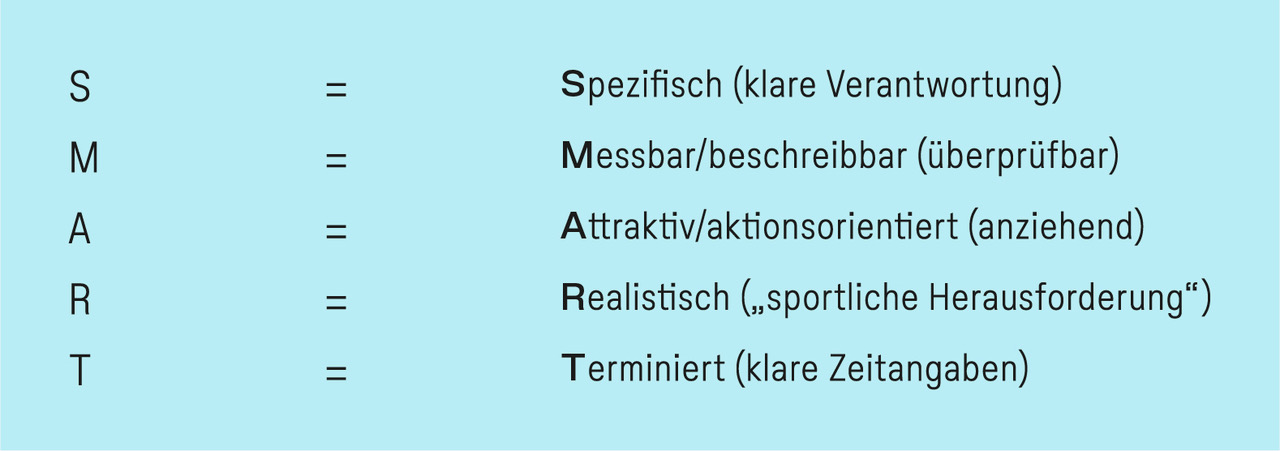What do the words “pull of the goal” trigger in you? Psychology professor Wolfgang Metzger coined this term to mean that a goal develops a pull when it meets an intrinsic need. So there has to be a connection between me and my goal, otherwise I don’t really set out on a sustainable path and stop pursuing my goal at the first major obstacle. The “A” in the well-known SMART formula for goal formulation focuses on this:

So what is the goal you want to achieve and is it related to one of your inner needs? And what might be the need behind the need?
Success factor 4: Really wanting to do something instead of having to force yourself to do it
When I keep at it, it also becomes clear whether I really want what I am striving for. It should be about my own goals, not about the expectations of others that I think I have to fulfil. Do you feel the pull of the goal? If you feel you have to force yourself to do something, then your will has not yet been strengthened. You probably also know such a: “actually I should….” Then you take on something that you are not (yet) completely convinced of, or you secretly think that the way you have been doing it so far is not so bad. Under such conditions, sustainable implementation will most likely not work. A circumstance that always brings magazines sales with the new ultimate diet suggestions in spring and a lot of frustration for the buyers when it doesn’t work out with losing weight again. Something that apparently the ancient Romans already knew, because the Latin word “frustra” means “in vain”, which means that I have once again outed myself as a Latin fan.
What do you really want? What do you think you have to force yourself to do? And what could alternatives look like?
Success factor 5: Establishing routines makes it easier to stick with it.
Anyone who, like me, has to take a medicine regularly knows how helpful routines are. Get up and first thing is the glass of water with the tablet. At some point this became second nature to me. One study found that you have to do something for at least 66 days on average to make a habit out of it. Such a routine makes self-discipline much easier. The French and English word “route” also means way, course, direction, itinerary, path. With a routine, I have built a path towards achieving my goal. If that doesn’t work, then either I haven’t really made the decision, my preparations weren’t clear enough or I have allowed old patterns to gain the upper hand.
If I have made a clear decision, said yes to my time frame, created a conducive environment and then look forward to doing it, I only need to give myself a little nudge, if at all. And then I don’t need to fight down any inner temptation, which is quite tame in the face of my determination. Once I have made a start, I need a kind of relaxed perseverance, i.e. even if I deviate from what I have planned now and then – for whatever reason – I return to it. An image from mindfulness training helps me: “The oxen that have strayed from the road are calmly and firmly guided back there by the farmer”.
Routines also have their dangers when they become automatisms that are carried out without awareness. But more about that another time.
What helpful routines have you already established? And at what points would it be good for you to have a routine?
Success factor 6: Rejoice in what you have achieved
There is nothing that strengthens one’s self-worth more than when I have the experience of actually having done what I set out to do. But this only works if I pause, realise this fact and rejoice in it. Then I can strengthen my conviction that I can overcome future challenges through my own actions. This is a concept developed by the Canadian psychologist Albert Bandura under the title “self-efficacy”. All too often, however, we go right back to business as usual, because we are reminded of beliefs we learned early on, such as that we shouldn’t rest on our laurels, that we shouldn’t take ourselves too seriously, and that it really wasn’t all that great. Again and again, as a coach, I feel compelled to ask clients to whom they attribute the success they have achieved and then to ask them to pat themselves on the back. Then most of them are amazed at how good it makes them feel.
How do you want to celebrate what you have achieved if you have been able to implement something planned with the help of better self-organisation?
With this in mind
Best regards
Yours, Harriet Kretschmar